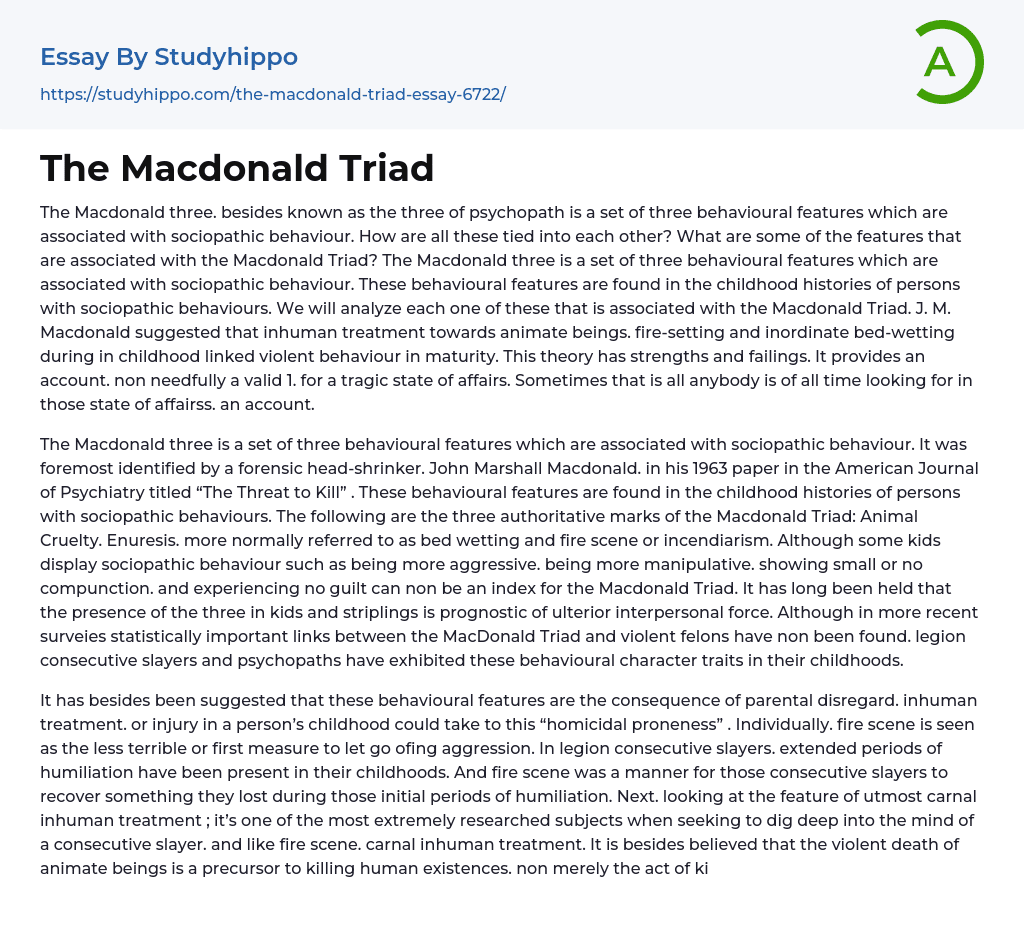The Macdonald Triad, also known as the three of psychopath, is a set of three behavioral features associated with sociopathic behavior. These features, which are found in the childhood histories of individuals with sociopathic behaviors, include inhuman treatment towards animals, fire-setting, and excessive bed-wetting. The theory proposed by J.M. Macdonald suggests that these behaviors during childhood are linked to violent behavior in adulthood. Despite its strengths and weaknesses, this theory provides an explanation, although not necessarily a valid one, for tragic situations. The Macdonald Triad was first identified by forensic psychiatrist John Marshall Macdonald in his 1963 paper titled "The Threat to Kill" in the American Journal of Psychiatry.Although some children exhibit sociopathic behavior, such as increased aggression, manipulation, lack of remorse, and guiltlessness, these traits cannot be used as indicators for the MacDonald Triad. The
...presence of these three factors in children and adolescents has traditionally been believed to predict later interpersonal violence. However, recent studies have not found statistically significant links between the MacDonald Triad and violent criminals. Nonetheless, many consecutive killers and psychopaths in their early years have displayed these behavioral characteristics. It has been suggested that these traits result from childhood experiences of parental neglect, abuse, or trauma, leading to a predisposition towards homicide. Fire setting is often seen as a less severe or initial step in releasing aggression, and many consecutive killers have experienced prolonged periods of humiliation in their childhoods. Fire setting becomes a way for these individuals to regain a sense of what they lost during those initial humiliations. Similarly, extreme animal cruelty is a highly researched aspect when exploring the mindset of a consecutive killer. Like fir
setting, animal cruelty is believed to be a precursor to the killing of human beings.Non merely the act of killing, but also the means of carrying out the murder on a human. The act of killing an animal is essentially reclaiming what they lost through humiliation from their peers, as they dominate something weaker than themselves. It has been suggested that children who later become serial killers use animals to release their frustrations because the person causing their humiliation is too powerful for them to handle. These future serial killers feel that they regain power and control over their lives by tormenting and killing animals, thus gaining the ability to inflict pain on their future victims. Personally, I disagree with the Macdonald Triad. While I do not doubt that all three factors individually indicate troubled behavior, I do not believe that their combination alone is enough to directly link them to violent behavior. To me, there is insufficient information to support the validity of these theories. The studies mentioned in the text only involve research counts of 84, 102, and 1200; this is not enough research or statistical data collection to convince me that these behaviors are direct factors in the actions exhibited by serial killers. The main flaw of this theory lies in the lack of research and diverse study groups. However, I believe that the strength of this theory lies in its potential, which could be realized through more funding, research, and studies.The Macdonald Triad is effective in illustrating the emotions behind an action and is believed to enhance the theory's credibility. The relationship between nature/nurture and a child's emotional development process is
crucial and often serves as a direct indication of their adult behavior or response.
- Child essays
- Childcare essays
- Child labor essays
- Doll essays
- Abnormal Psychology essays
- Abraham Maslow essays
- Attachment Theory essays
- Authority essays
- Behaviorism essays
- Classical Conditioning essays
- Cognitive Psychology essays
- Counseling essays
- Developmental Psychology essays
- Educational Psychology essays
- Erik Erikson essays
- Family Therapy essays
- Jean Piaget essays
- Maslow's Hierarchy Of Needs essays
- Mental Health essays
- Operant Conditioning essays
- Personality Psychology essays
- Positive Psychology essays
- Psychoanalysis essays
- Psychotherapy essays
- Sigmund Freud essays
- Social Psychology essays
- Stanford Prison Experiment essays
- Supersize Me essays
- Adoption essays
- Aunt essays
- Babies essays
- Bedroom essays
- Caring essays
- Children essays
- Daughter essays
- Divorce essays
- Dog essays
- Dysfunctional Family essays
- Family Tradition essays
- Family Values essays
- Father essays
- Foster Care essays
- Friends essays
- Grandparent essays
- Home essays
- Hometown essays
- Husband essays
- Jealousy essays
- Love essays
- Marriage essays




